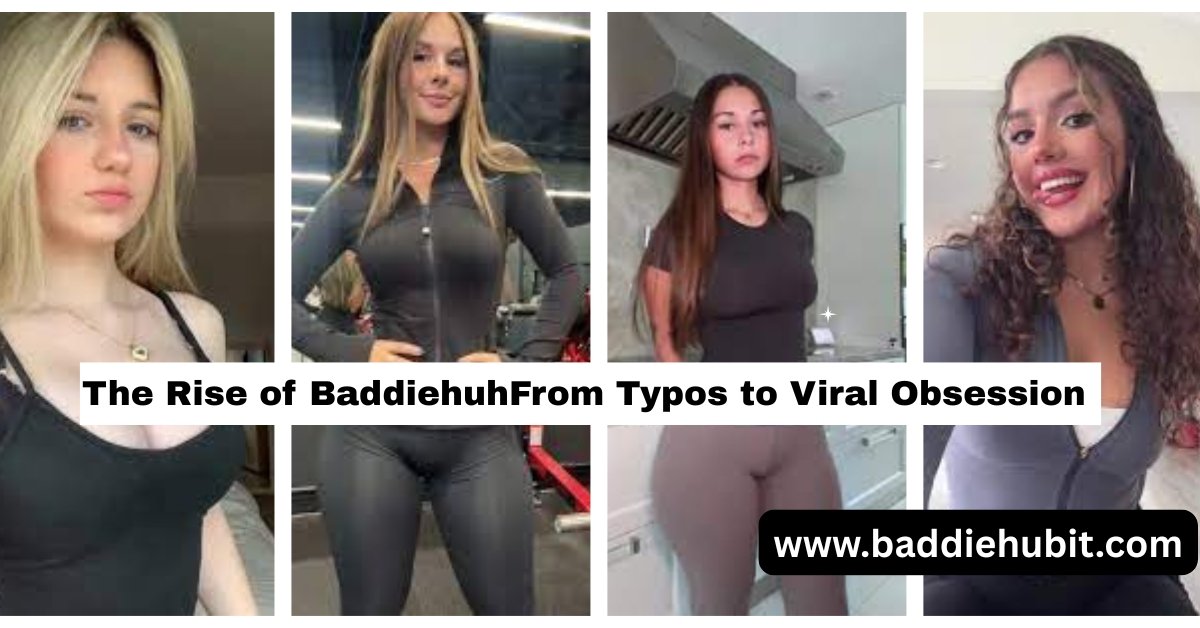Introduction
In today’s fast-paced digital world, some words catch fire online with little explanation. One such term is baddiehuh — a keyword that has been floating across search engines, social media platforms, and even group chats. But what exactly is baddiehuh? Is it a platform, a person, a meme, or something else entirely?
People are endlessly typing, tapping, and guessing terms like baddiehuh, trying to land on the right content. But in doing so, they create an entire ecosystem of spelling mistakes, alternate forms, and domain confusion. From badie hub to baddihub, from baddi hub to baddiehub con, it’s all part of the same mysterious trend orbiting around a name that nobody fully understands — yet everyone seems to be searching for.
The Rise of Baddiehuh
A Viral Name Without a Face
At first glance, baddiehuh seems like a typo. But as it continues to trend, it’s becoming clear that this term has grown far beyond a simple mistake. The word blends the modern “baddie” aesthetic with a quirky suffix — “huh” — possibly meant to reflect curiosity, confusion, or even sass.
While users look for baddiehuh, many accidentally land on completely different versions of the name. They might type baddiehub com or baddiehub home thinking they’re close. Others may mistakenly go to baddiehub., type in baddiehub.vom, or even confuse it with baddiehub con — unaware that they’ve strayed into potentially unsafe or unrelated territory.
Keyword Confusion: A Typo Web Around Baddiehuh
The rise of baddiehuh is tangled up in a web of close spellings, typos, and phonetic variations. For example, someone may mean to search baddiehuh but enter badie hub, baddihub, or baddi hub instead.
Others get even more creative (or confused) and search terms like baddiehub., baddiehu, or baddiehun, assuming they’re hitting the right spot. There’s even confusion with baddieub, baddie hu, and the common misspelling bhaddiehub — all used regularly by curious users trying to locate something intriguing.
Further down the typo chain, there’s baddehub, addiehub, and even naddiehub — terms that sound similar but deviate further from the source. Still, search engines index them, and some shady websites even buy these domains to redirect traffic.
And it doesn’t stop there. Names like baddiegub, baddue hub, baddiehib, and badieshub also appear in search trends, even though many of them don’t lead to real platforms. That’s the power — and chaos — of a trending term like baddiehuh.
The Aesthetic Behind Baddiehuh
What Is the “Baddie” Lifestyle?
To understand the appeal of baddiehuh, we need to first understand the concept of the “baddie.” A “baddie” in internet culture is someone who’s confident, stylish, bold, and unafraid to express themselves. This identity thrives on platforms like TikTok and Instagram, where fashion-forward selfies, luxury aesthetics, and attitude-packed captions dominate.
Baddiehuh, with its mysterious vibe, seems to represent a digital extension of that persona — a place or brand that aligns with this bold identity. It’s no surprise, then, that users searching for it are also typing in similar phrases like baddiehub home, thinking they’ll find content or a platform that reflects that style.
Gen Z and the Curiosity Economy
Gen Z users, who’ve grown up immersed in online trends, are naturally drawn to names like baddiehuh. There’s a playful confusion in the name itself — “huh” suggests something slightly offbeat, even ironic. This appeals to Gen Z’s love for mystery, aesthetic irony, and meme culture.
But the more people type in baddiehuh, the more others mimic that behavior — leading to thousands of alternate searches like baddiehub com, baddiehub., or baddiehub.vom, each slightly different, but all part of the same search cloud.
The Business of Typos: Marketers Love Misspellings
Why Typo Traffic Matters
Believe it or not, all those misspellings — from badie hub, baddihub, and baddi hub, to baddiehub con and baddiehuv — are incredibly valuable to marketers. This is known as typo traffic, where people accidentally visit a website due to a minor error in spelling. Businesses and domain squatters capitalize on this by registering variations like baddiehub., baddiehu, or baddiehun — just to catch a piece of the digital pie.
Even strange spellings like baddieub, baddie hu, or phonetic twists like bhaddiehub get thousands of monthly impressions. The goal? To either redirect visitors to an ad-filled page or to trick them into visiting a copycat site.
Domains like baddehub, addiehub, naddiehub, and baddiegub are often created just to take advantage of how fast people type or how their devices auto-correct. It’s a modern hustle, and baddiehuh is sitting right at the center of it.
Creative Confusion: More Than Just a Name
Some variations — like baddue hub, baddiehib, or badieshub — may not even be intentional. They might’ve come from misheard names, speech-to-text errors, or random guessing. But that hasn’t stopped search engines from indexing them or users from clicking on them.
This kind of keyword chaos shows how one mysterious name — baddiehuh — can spawn an entire digital subculture of typos, guesswork, and curiosity.
Is Baddiehuh Real or Just a Viral Illusion?
Searching for Something That Might Not Exist
What makes baddiehuh even more fascinating is the uncertainty surrounding it. Many users aren’t even sure what they’re looking for — a website, an app, a person, or just a meme? Some expect baddiehuh to be an edgy version of baddiehub, while others simply follow what’s trending, typing it in just to see what comes up.
That confusion is what gives baddiehuh its viral energy. And during this search frenzy, people often misclick or mistype, ending up on totally unrelated domains like baddiehub.vom or baddiehub con. Some even land on shady or ad-heavy sites when they accidentally type baddiehub com or baddiehub. — small errors with big effects.
The Baddiehub Clone Effect
The core concept of baddiehuh seems to revolve around the known word baddie and the widely searched platform baddiehub. Whether baddiehuh is a clever play on that or an emerging brand, it has already been surrounded by countless clones, typo-domains, and SEO traps.
Try typing something like baddiehu, baddiehun, or baddieub, and you might find yourself on spammy websites or sketchy landing pages. That’s not by accident — these domains are often purchased to scoop up traffic from users looking for baddiehuh but missing the mark.
Even more distant typos like badie hub, baddihub, or baddi hub are part of the keyword cloud. Each one feeds into the mystery, keeping users cycling through results hoping to find the real destination.
SEO Games: How Marketers Exploit the Baddiehuh Trend
Owning the Keyword Space
In SEO (Search Engine Optimization), whoever controls the keywords controls the traffic. That’s why so many digital marketers and opportunistic site owners are rushing to include terms like baddiehub home, baddiehub com, or even wildly misspelled ones like bhaddiehub, baddiegub, and baddehub into their content.
They don’t care whether the term has clear meaning — they care that it gets searched.
Sometimes, random-looking phrases like addiehub, naddiehub, baddiehib, or badieshub are included purely to attract stray clicks. You might not find anything useful on those sites, but they’ve already won by capturing your attention — and your visit.
The Power of Curiosity-Based Keywords
People don’t always search with full knowledge. Most simply follow curiosity. That’s why baddiehuh is so powerful — it feels like a secret waiting to be discovered. Combine that with curiosity-charged keywords like baddiehuv, baddue hub, and baddie hu, and you’ve got a viral snowball effect.
Even people who aren’t actively looking for baddiehuh might click on related terms out of interest. It’s the same reason someone might click on a cryptic link or follow a strange trend on TikTok — we’re wired to chase what we don’t understand.
What Do People Expect from Baddiehuh?
Is It a Platform, a Persona, or a Portal?
The viral rise of baddiehuh isn’t just about how it’s spelled — it’s about what people expect it to be. The keyword carries a vibe: something exclusive, edgy, maybe even underground. Many assume it’s the next version of a “baddie” platform like baddiehub, but with a twist. That’s why so many searches for baddiehuh are accompanied by other guesses like baddiehub home, baddiehub com, and baddiehub.
People imagine they’ll find curated content, trendy aesthetics, or perhaps a secret members-only site. Some guess it’s short for a URL or brand like baddiehu, baddiehun, or baddieub. And even when they type in mistakes like baddiehuv or baddiehub.vom, they’re still hoping to land on something “baddie-coded.”
The Influence of Internet Mythology
In many ways, baddiehuh functions like internet folklore. It spreads through whispers — TikTok comments, Reddit threads, casual DMs — with no official definition. That mystery only adds fuel to the trend.
It’s why people type things like baddiehub con, badie hub, or baddihub — not because they know what it is, but because everyone else seems to be looking for it too. That kind of communal curiosity is powerful.
Other spin-offs like baddi hub, bhaddiehub, baddehub, addiehub, and naddiehub have followed the same path — not as brands, but as shadow searches circling the main keyword.
Even distant guesses like baddiegub, baddue hub, baddiehib, and badieshub still get typed into search bars, proving that the desire to find something is stronger than knowing exactly what that something is.
Final Thoughts: Why Baddiehuh Isn’t Going Anywhere
A Trend Built on Mystery and Mistakes
In the end, the popularity of baddiehuh is built not just on its aesthetic or sound, but on its mystery. It blends the confidence of the “baddie” persona with a playful, undefined vibe that keeps people searching. It’s a rare example of a keyword becoming a cultural moment — fueled by spelling errors, curiosity, and hype.
From baddie hu to baddiehub., from baddiehub com to baddiehuh itself, the entire ecosystem is a digital reflection of how modern internet culture works: chaotic, trend-driven, and full of accidental genius.
Marketers can try to capitalize on it, users can try to define it, and domains can copy it — but one thing’s clear:
Baddiehuh isn’t just a keyword anymore. It’s a digital mystery people can’t stop chasing.




